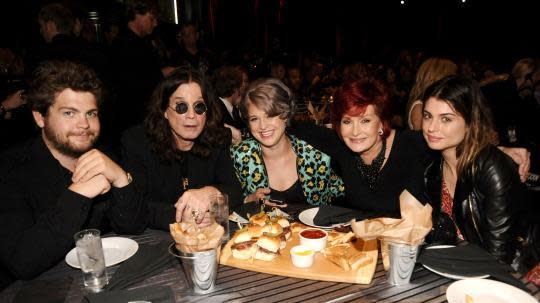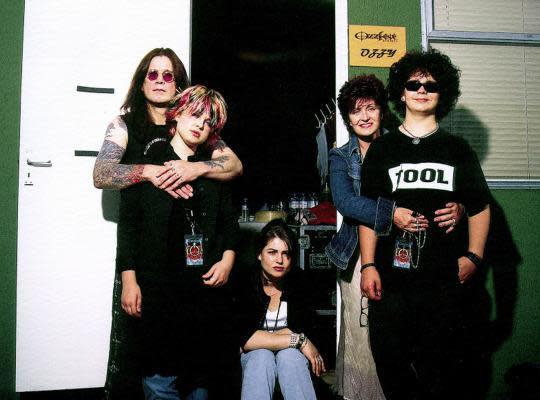When One Sibling Doesn't Fit In: Rare Interview With Osbourne Sister Who Refused to Appear on TV

Aimee Osbourne (far right) with her parents and siblings in 2010. (Photo: Getty Images)
For four seasons on their MTV reality show The Osbournes, Black Sabbath rocker Ozzy, his wife Sharon, and their kids Kelly and Jack revealed all about their family — except, that is, anything to do with their eldest child, Aimee.
The aspiring singer refused to join the show and promptly moved out when filming began in their L.A. mansion back in 2002. Now, 14 years later, the 32-year-old is finally speaking out about those divisive days. “Back then, I still felt I was trying to figure out who I was in the chaos of family life, so why on earth would I want that portrayed on television?“ she said in an interview with London’s Independent, published on Sunday. “I wanted to protect myself, my parents, my siblings, too. They were very young, very impressionable.“
STORY: What We Can Learn About Sibling Rivalry From Serena and Venus Williams

The Osbourne family in 2002. (Photo: Everett Collection)
The age difference between the siblings was slight — when filming began with Jack was 16, Kelly, 17, and Aimee almost 18 — but the difference in their perspectives was vast. “I suppose I was the one that had to be in control a lot of the time,” she said, referring to the family’s drug problems, which prompted rehab stints for Ozzy, Kelly, and Jack. “But then it came naturally. And, for me, watching people get out of control, and be indulgent and dramatic was … well, very silly…. When you are already surrounded by that kind of thing, you either surrender fully and accept it as your destiny, or you think to yourself, ‘You know what? I’m not going to try that, actually.’ OK, it may have been their thing, but I didn’t want to do that. I kept it together, mostly.”
STORY: 6 Things to Do When Sibling Rivalry Turns Into Bullying

Jack and Aimee in 2003. (Photo: Getty Images)
And while separating herself may have saved her from similar addiction issues, it cost her a relationship with her siblings. Aimee revealed to the Independent that she’s close with her parents but rarely spends time with her brother and sister, even though they live in the same city. “I wouldn’t say there is an ease between us, but there is an acceptance,” she explained. “Do we socialize? No."

Aimee and Kelly in 2003. (Photo: Getty Images)
Why is it that sometimes difference separates siblings and other times it doesn’t? “It all depends on the parents,” according to Dr. Laura Markham, a Brooklyn-based child psychologist, who literally wrote the book on siblings: Peaceful Parent, Happy Siblings: How to Stop the Fighting and Raise Friends for Life. “Do they create a family culture of acceptance and tolerance, of embracing difference? Or do they ostracize the child who is different?”

Aimee, photographed earlier this year. (Photo: Getty Images)
The Osbournes’ situation is unique, of course, with Ozzy and Sharon consenting to the TV show against Aimee’s pleas not to ("It didn’t matter what I thought, ultimately,” she told the Independent, adding, “Obviously, I would have liked to stay at home a little longer”), but there are lessons that all parents can learn from them. “If the parents don’t show up for their daughter,” says Markham, “you can’t expect the siblings to do so.”
Fostering a relationship between siblings is the parents’ duty, the expert explains. And it starts with “making sure that every child feels equally valued and respected in the family.” For instance, “Dad may be a football nut and go to every one of Junior’s games, but he also needs to show genuine interest in his daughter’s piano playing and go to her recitals.”
While it’s also essential that parents refrain from comparing their children, so as not to incite rivalry, they’ll also make great strides if they reinforce the idea that all the kids are on the same team. “Emphasize that, in a family, we all support each other and we always work things out with each other, no matter what,” says Markham. “We will always be there for each other.”
Creating — and supporting — kids’ positive interactions is the vital follow-through. “Research shows that is the most important factor in whether children are close later in life,” explains Markham, who offers a few specific guidelines from her book Peaceful Parent, Happy Siblings.
Notice and promote the activities that get your children playing together. “Research on improving sibling relationships shows that children have better relationships when they share activities they both enjoy.”
Strategically unite siblings as a team.
“Instead of pitting your children against each other, find ongoing ways to unite them in the same mission,” she writes. “‘Can you work together so you’re both ready to leave the house at 8 a.m.? That will give us time to go the long way to school so we can see the bulldozers at the construction site again. Yes? What a team!’”
Honor individuality and celebrate difference.
“Talk often about the fact that each member of the family is unique, brings a different perspective that is to be respected, and is valuable just because they are themselves, The family needs each person for it to be whole.”
Please follow @YahooParenting on Facebook, Twitter, Instagram, and Pinterest. Have an interesting story to share about your family? Email us at YParenting (at) Yahoo.com.

